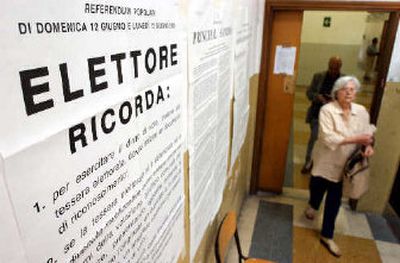Fertility vote seen as win for Vatican

ROME – In a victory for the Vatican, Italian voters shunned a referendum that would have eliminated bans on egg and sperm donation, freezing embryos and other widely used methods by couples wanting to have children.
Pope Benedict XVI had endorsed a call by Italian bishops for a boycott of the vote, held Sunday and Monday. The four ballot measures drew 25.9 percent of eligible voters, roughly half the required turnout of 50 percent plus one for the results to be binding on Parliament.
The vote was seen as a test of the Vatican’s influence in a country that is overwhelmingly Roman Catholic but has strayed from church doctrine, notably by approving divorce and abortion in referendums decades ago.
The referendums would have ended a limit on the number of embryos that can be created at one time and lifted bans on freezing them for future implantation or screening them for defects. In addition, a provision that gives embryos the same legal rights as those who are born would have been eliminated.
The Holy See’s press office said it had no comment. But the Vatican’s missionary news agency Fides touted the referendums’ failure as proof of the church’s influence in Italy, an officially secular state that hosts the Holy See on its territory.
Cardinal Camillo Ruini, the Italian bishops’ conference leader who championed the boycott appeal, dismissed talk that the Catholic church was the victor.
“What really won was the moral conscience of our people and the future of man himself,” Ruini said in an interview on private Canale 5’s evening news.
Some Italians were taken aback by the poor turnout.
“I didn’t expect such a low turnout,” said Domenico Costantino, 29, a fund-raiser in Rome for the aid group Save the Children. He said the intervention of the church and political parties influenced people’s choices.
“I am not disappointed that the referendums failed,” said Carmen Maulicino, a shop assistant in Rome. “The cycle of life is a natural thing and we should not interfere by manipulation.”
A recent Associated Press-Ipsos poll found that nearly two-thirds of Italians think religious leaders should not try to influence government decisions. And in random interviews, many denounced the church campaign as invasive.
Italians defied Vatican teaching in a 1974 referendum that upheld divorce and again in 1981, in a vote that upheld Italy’s liberal abortion law.
But Ruini denied the abortion law was the next target, calling such concern “invented.”